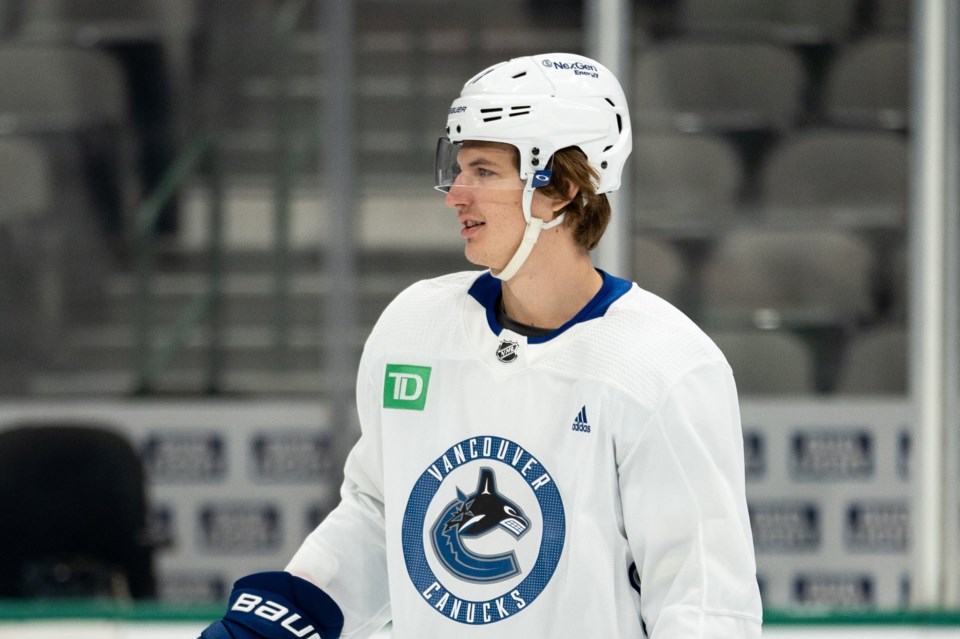The Vancouver Canucks have signed another free agent.
Don't get too excited. It's not a new free agent, but one that was already in the Canucks' system.
On Tuesday afternoon, the Canucks announced that they signed restricted free agent Vitali Kravtsov to a one-year, two-way contract.
General Manager Patrik Allvin announced today that the #Canucks have agreed to terms with F Vitali Kravtsov on a one-year, two-way contract.
— Vancouver Canucks (@Canucks) August 5, 2025
Kravtsov's contract carries a league-minimum $775,000 cap hit in the NHL and pays a $450,000 salary in the AHL, which is a significant minor-league salary for a two-way contract. By way of comparison, Arshdeep Bains, who led the Abbotsford Canucks in scoring last season, has a $290,000 salary in the AHL in his new contract.
The Canucks traded for Kravtsov in 2023, sending Will Lockwood and a seventh-round pick to the New York Rangers for the former ninth-overall pick. They were taking a swing on a reclamation project, as Kravtsov hadn't found a fit with the Rangers, managing just 10 points in 48 NHL games at the time of the trade.
The reclamation project didn't pay off, as Kravtsov was invisible for the rest of the 2022-23 season. He put up 2 points in 16 games with the Canucks and struggled defensively, leading to then-head coach Rick Tocchet scratching the Russian winger down the stretch. At the end of the season, Kravtsov decided to return to Russia, signing a two-year deal in the KHL with Traktor Chelyabinsk.
The Canucks, however, gave Kravtsov a qualifying offer to retain his signing rights, just in case. At the time, it seemed like an empty gesture, as it looked like Kravtsov was likely going to be in Russia for good, destined to forever be "in the Canucks' system" like Kirill Koltsov, yet never play for them again.
Then a funny thing happened: Kravtsov got good.
This past season, Kravtsov was one of the top forwards in the KHL, finishing ninth in the league in goals and sixth in points with 27 goals and 58 points in 66 games. More than that, Kravtsov was a league-leading plus-31, which is mind-bending given his previous defensive issues.
Word came out of Russia that the 25-year-old wanted to make a return to the NHL with his two-year contract coming to a close. That meant re-signing with the Canucks unless they traded his rights. With the Canucks needing more scoring on a budget, they weren't trading his rights, instead signing him to a one-year contract.
That one-year contract will take Kravtsov to unrestricted free agency, so if he excels, he could easily bolt the Canucks to sign with another team a year from now. That's a major incentive for Kravtsov, providing plenty of motivation.
Of course, that may not be a major concern. As good as Kravtsov was in the KHL last season, the quality of the league has to be taken into consideration. Former Canuck Josh Leivo led the KHL in scoring with 49 goals and 80 points in 62 games; he had 16 points in 51 games in his last NHL season two years ago.
Another former Canuck, Sheldon Rempal, finished a few goals and points ahead of Kravtsov in scoring; he played a career-high nine NHL games in the previous season.
In other words, production in the KHL does not necessarily reflect how well that player will perform in the NHL.
Still, bringing Kravtsov back is a good move by the Canucks. He's a big, strong-skating winger who can be dangerous off the rush, and if his improved plus/minus in the KHL is any indication, he ought to be a better two-way player than he was a couple of years ago. It's a low-cost, low-risk move that has the potential for a significant payoff if everything clicks in his second go-around in Vancouver.
At the same time, this could just end with Kravtsov struggling in the preseason, going on waivers, and either getting claimed by another NHL team or heading down to the Abbotsford Canucks in the AHL.
That likely explains the high salary in the AHL next season; if Kravtsov does end up getting sent down to Abbotsford, they want to make sure that he sticks around and is available to be called up, rather than bolting for Russia.




